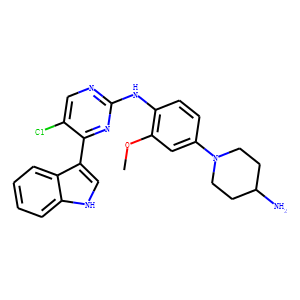| Reference | 1. Sci Rep. 2016 Jan 20;6:19423. doi: 10.1038/srep19423.
<br>
Novel ALK inhibitor AZD3463 inhibits neuroblastoma growth by overcoming
crizotinib resistance and inducing apoptosis.
<br>
Wang Y(1)(2), Wang L(3)(4), Guan S(2), Cao W(3)(5), Wang H(3)(6), Chen Z(2), Zhao
Y(2), Yu Y(2), Zhang H(2), Pang JC(2), Huang SL(2), Akiyama Y(2), Yang Y(2), Sun
W(7), Xu X(2), Shi Y(7), Zhang H(3), Kim ES(7), Muscal JA(2), Lu F(1), Yang J(2).
<br>
Author information: <br>
(1)Department of Microbiology, Peking University Health Science Center, Beijing
100191, China.
(2)Texas Children/’s Cancer Center, Department of Pediatrics, Dan L. Duncan Cancer
Center, Baylor College of Medicine, Houston, Texas 77030, USA.
(3)Department of Pathology, University of Texas MD Anderson Cancer Center,
Houston, Texas 77030, USA.
(4)Department of Acupuncture, First Affiliated Hospital, Heilongjiang University
of Chinese Medicine, Harbin, Heilongjiang 150040, China.
(5)Department of Medical Oncology, Zhejiang Cancer Hospital, Hangzhou, Zhejiang
310022, China.
(6)Department of Hepatopancreatobiliary Surgery, the Second Affiliated Hospital
of Harbin Medical University, Harbin, Heilongjiang 150086, China.
(7)Division of Pediatric Surgery, Michael E. DeBakey Department of Pediatric
Surgery, Dan L. Duncan Cancer Center, Baylor College of Medicine, Houston, Texas
77030, USA.
<br>
ALK receptor tyrosine kinase has been shown to be a therapeutic target in
neuroblastoma. Germline ALK activating mutations are responsible for the majority
of hereditary neuroblastoma and somatic ALK activating mutations are also
frequently observed in sporadic cases of advanced NB. Crizotinib, a first-line
therapy in the treatment of advanced non-small cell lung cancer (NSCLC) harboring
ALK rearrangements, demonstrates striking efficacy against ALK-rearranged NB.
However, crizotinib fails to effectively inhibit the activity of ALK when
activating mutations are present within its kinase domain, as with the F1174L
mutation. Here we show that a new ALK inhibitor AZD3463 effectively suppressed
the proliferation of NB cell lines with wild type ALK (WT) as well as ALK
activating mutations (F1174L and D1091N) by blocking the ALK-mediated
PI3K/AKT/mTOR pathway and ultimately induced apoptosis and autophagy. In
addition, AZD3463 enhanced the cytotoxic effects of doxorubicin on NB cells.
AZD3463 also exhibited significant therapeutic efficacy on the growth of the NB
tumors with WT and F1174L activating mutation ALK in orthotopic xenograft mouse
models. These results indicate that AZD3463 is a promising therapeutic agent in
the treatment of NB.
DOI: 10.1038/srep19423
PMCID: PMC4726162
PMID: 26786851 [Indexed for MEDLINE]
<br>
2. PLoS One. 2015 Nov 16;10(11):e0142704. doi: 10.1371/journal.pone.0142704.
eCollection 2015.
<br>
Vorinostat Enhances Cytotoxicity of SN-38 and Temozolomide in Ewing Sarcoma Cells
and Activates STAT3/AKT/MAPK Pathways.
<br>
Sampson VB(1), Vetter NS(1), Kamara DF(1), Collier AB(2), Gresh RC(1), Kolb
EA(1).
<br>
Author information: <br>
(1)Nemours Center for Cancer and Blood Disorders, Nemours/A.I. duPont Hospital
for Children, Wilmington, Delaware, United States of America.
(2)Department of Pediatrics, Division of Hematology and Oncology, Children/’s
Healthcare of Mississippi, University of Mississippi Medical Center, Jackson, MS,
United States of America.
<br>
Histone deacetylase inhibitors (HDACi) have been evaluated in patients with Ewing
sarcoma (EWS) but demonstrated limited activity. To better understand the
potential for HDACi in EWS, we evaluated the combination of the HDACi vorinostat,
with DNA damaging agents SN-38 (the active metabolite of irinotecan and
topoisomerase 1 inhibitor) plus the alkylating agent temozolomide (ST). Drugs
were evaluated in sequential and simultaneous combinations in two EWS cell lines.
Results demonstrate that cell viability, DNA damage and reactive oxygen species
(ROS) production are dependent on the sequence of drug administration. Enhanced
cytotoxicity is exhibited in vitro in EWS cell lines treated with ST administered
before vorinostat, which was modestly higher than concomitant treatment and
superior to vorinostat administered before ST. Drug combinations downregulate
cyclin D1 to induce G0/G1 arrest and promote apoptosis by cleavage of caspase-3
and PARP. When ST is administered before or concomitantly with vorinostat there
is activation of STAT3, MAPK and the p53 pathway. In contrast, when vorinostat is
administered before ST, there is DNA repair, increased AKT phosphorylation and
reduced H2B acetylation. Inhibition of AKT using the small molecule inhibitor
MK-2206 did not restore H2B acetylation. Combining ST with the dual ALK and
IGF-1R inhibitor, AZD3463 simultaneously inhibited STAT3 and AKT to enhance the
cytotoxic effects of ST and further reduce cell growth suggesting that STAT3 and
AKT activation were in part mediated by ALK and IGF-1R signaling. In summary,
potent antiproliferative and proapoptotic activity were demonstrated for ST
induced DNA damage before or simultaneous with HDAC inhibition and cell death was
mediated through the p53 pathway. These observations may aid in designing new
protocols for treating pediatric patients with high-risk EWS.
<br>
|

